译林牛津版 模块四 Unit1 Advertising直接引语变间接引语课件(共30张PPT)
文档属性
| 名称 | 译林牛津版 模块四 Unit1 Advertising直接引语变间接引语课件(共30张PPT) |  | |
| 格式 | zip | ||
| 文件大小 | 775.7KB | ||
| 资源类型 | 教案 | ||
| 版本资源 | 牛津译林版 | ||
| 科目 | 英语 | ||
| 更新时间 | 2019-05-16 16:52:04 | ||
图片预览


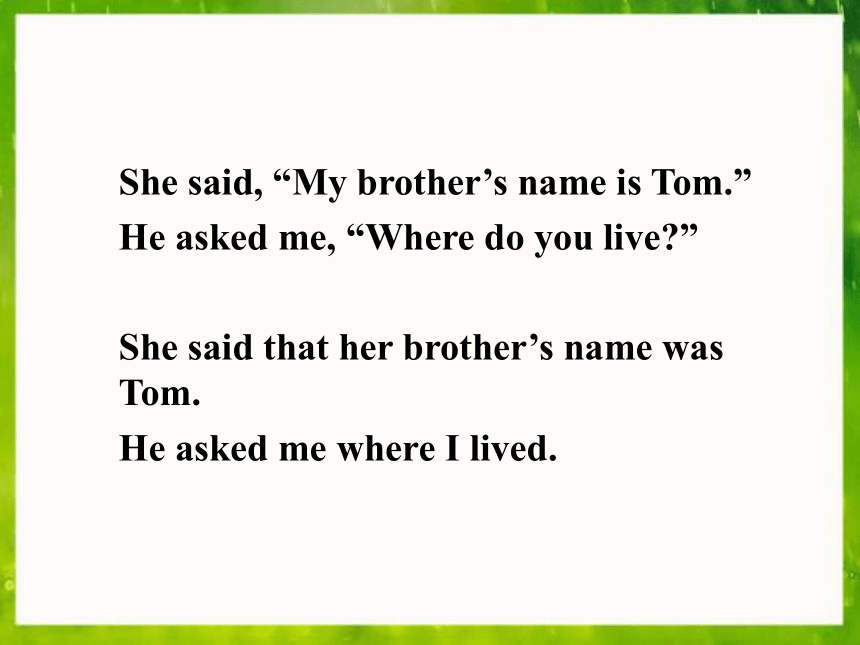
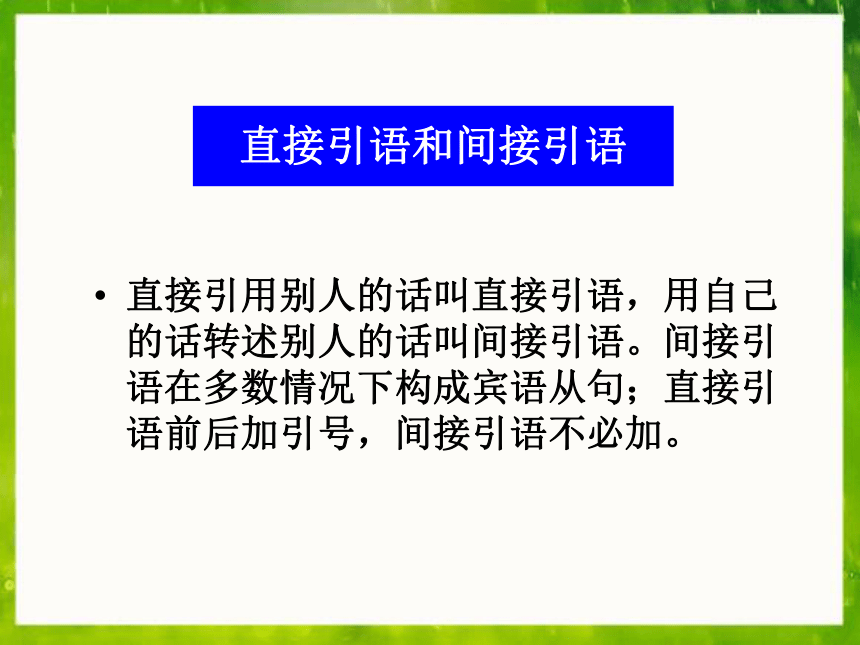


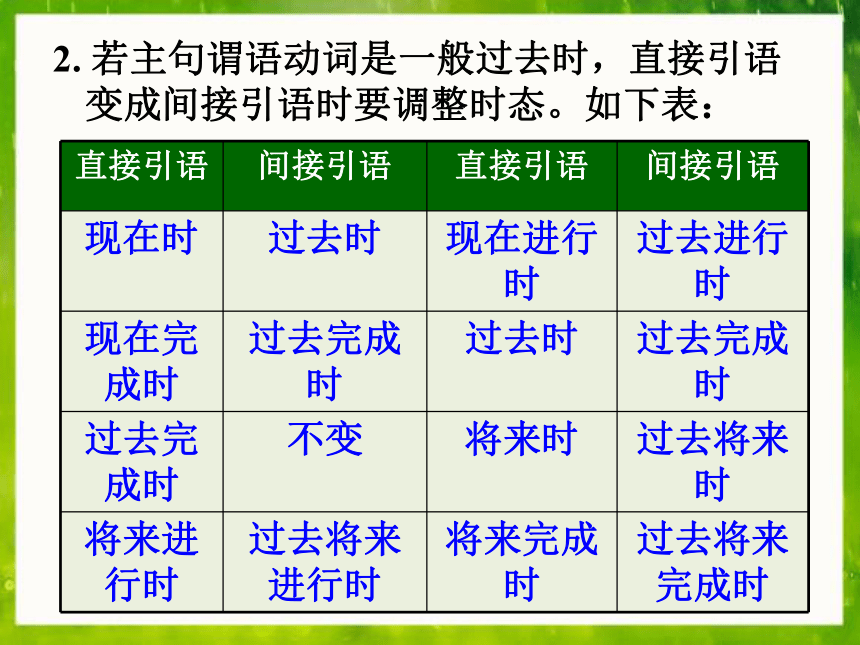
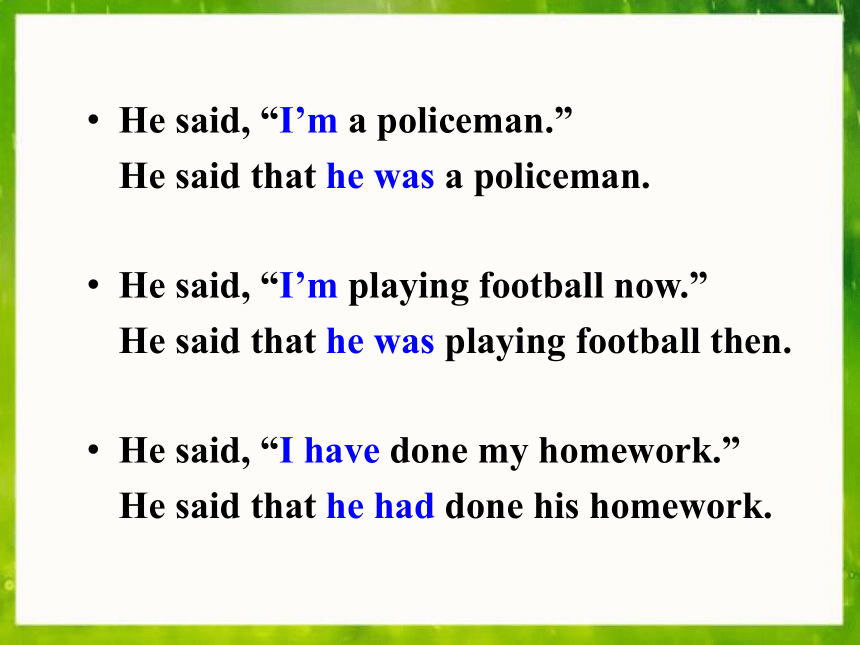
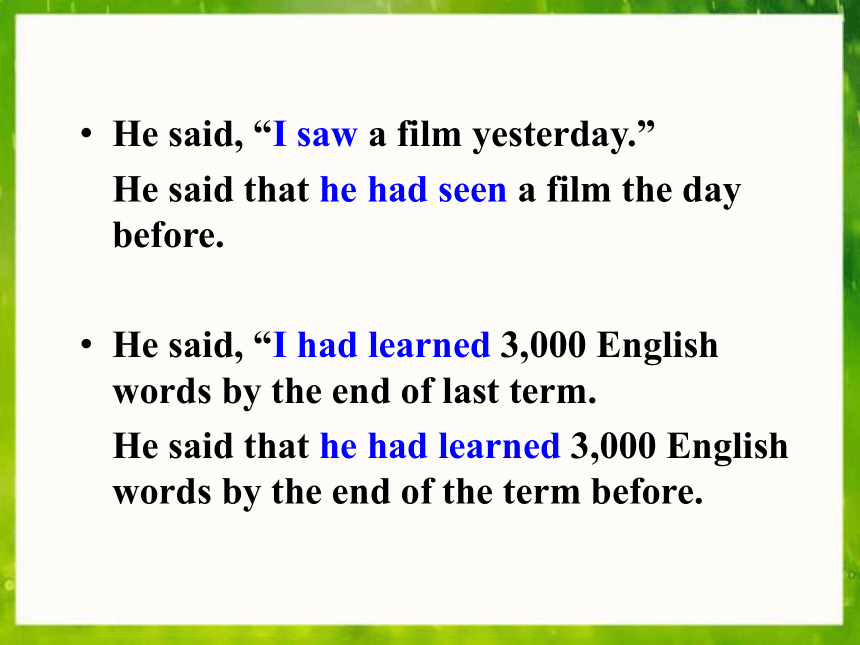
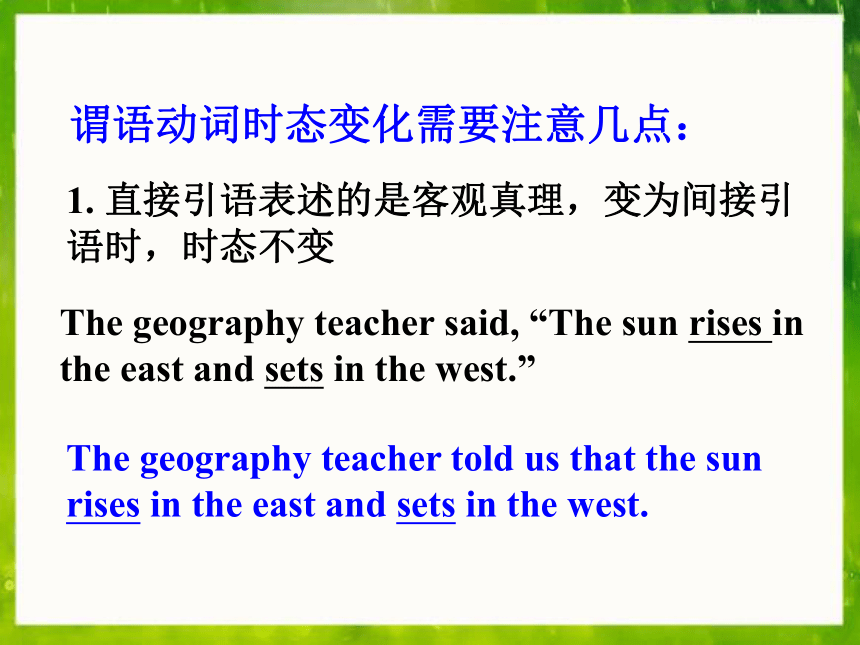
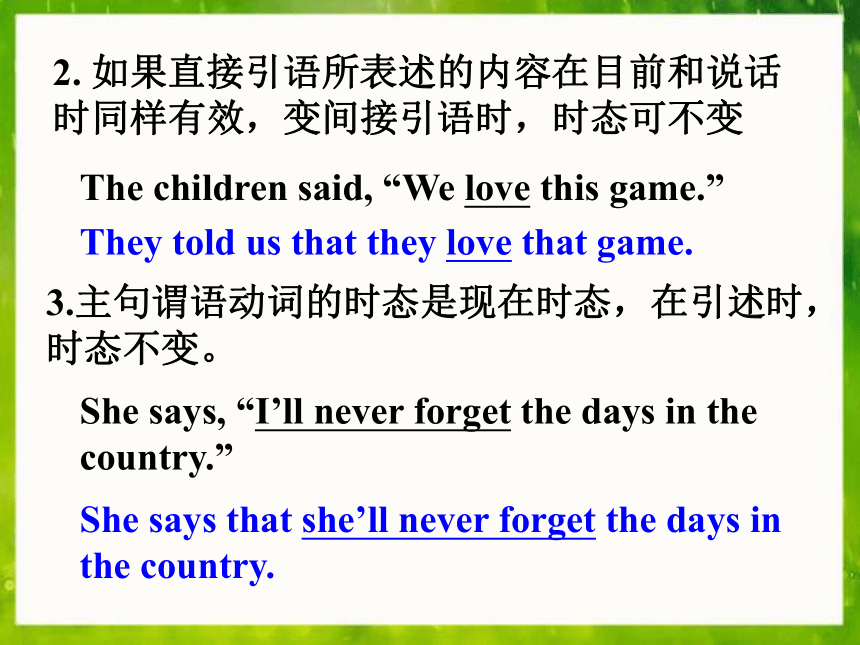
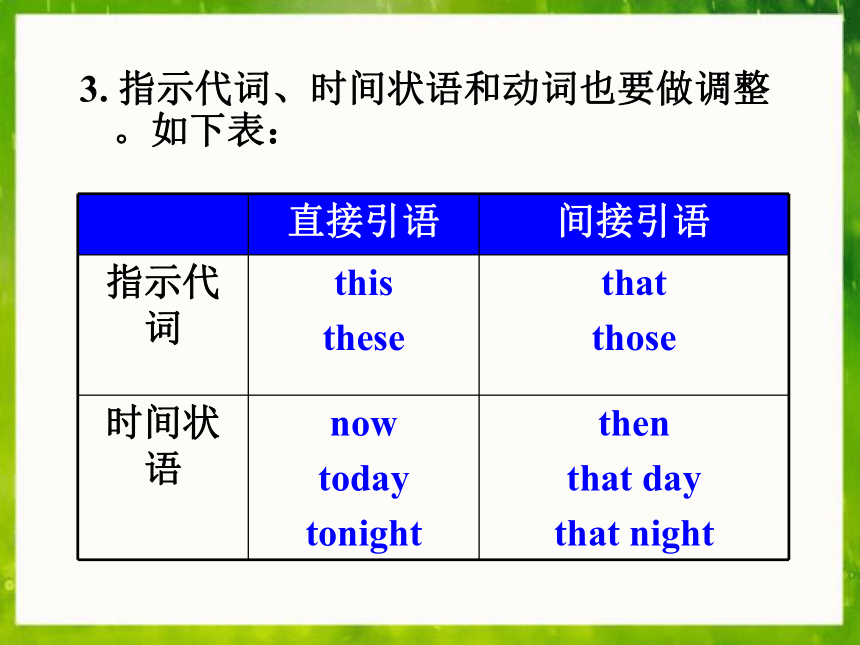
文档简介
课件30张PPT。Unit 1Direct speech and reported speech
She said, “My brother’s name is Tom.”
He asked me, “Where do you live?”
She said that her brother’s name was Tom.
He asked me where I lived.直接引语和间接引语直接引用别人的话叫直接引语,用自己的话转述别人的话叫间接引语。间接引语在多数情况下构成宾语从句;直接引语前后加引号,间接引语不必加。直接引语和间接引语的转换在直接引语向间接引语转换的过程中,不仅要进行句式上的转换,而且常常要在时间、地点、人称等方面做相应的转换。
1. 直接引语的主语是第一人称,改为间接引语后要根据意思改变人称。如:
She said, “I’m hungry.”
She said that she was hungry. 人称的变化一
随
主二随宾第三
人称
不变
引号内的第一人称变间引后与主句主语的人称保持一致引号内的第二人称变间引后与主句宾语的人称保持一致引号内的第三人
称在变间引后人
称不变She said,“ I like
tennis.”She said that she
liked tennis.He said to Lily,
“ You must get
up early.”He told Lily that
she must get up
early.She said to me ,
“ They want to
help him.”She told me that
they wanted help
him.一随主,二随宾,第三人称不更新2. 若主句谓语动词是一般过去时,直接引语变成间接引语时要调整时态。如下表:He said, “I’m a policeman.”
He said that he was a policeman.
He said, “I’m playing football now.”
He said that he was playing football then.
He said, “I have done my homework.”
He said that he had done his homework.He said, “I saw a film yesterday.”
He said that he had seen a film the day before.
He said, “I had learned 3,000 English words by the end of last term.
He said that he had learned 3,000 English words by the end of the term before.The geography teacher told us that the sun rises in the east and sets in the west.谓语动词时态变化需要注意几点:The geography teacher said, “The sun rises in the east and sets in the west.”1. 直接引语表述的是客观真理,变为间接引语时,时态不变She says that she’ll never forget the days in the country.The children said, “We love this game.”They told us that they love that game.She says, “I’ll never forget the days in the country.”2. 如果直接引语所表述的内容在目前和说话时同样有效,变间接引语时,时态可不变3.主句谓语动词的时态是现在时态,在引述时,时态不变。3. 指示代词、时间状语和动词也要做调整。如下表:“I don’t want to go sightseeing,” said ???? John.
→ John said that ____________ to go sightseeing.
2. The mother said, “I’m cooking.”
→The mother said that ______________.
3. Daisy said, “I have bought a new computer.”
→Daisy said that ______________ a new computer. Practicehe didn’t want she was cookingshe had bought4. They said, “We stayed in America.” ??→They said that __________________ in ???? America.
5. He said, “I had left for Beijing before ???? you called me.”
→He said that _________ for Beijing ???? before _________.
6. Tom said, “I will explain it to you after class.”
→Tom said that he ____________________
after class.
7. She said, “I will buy this book today.” ? →She said she _______________________. they (had) stayed he had left
I called himwould explain it to mewould buy that book that day8. The old man said, "I am surprised with
the changes that have taken place here.“
→The old man said ________ surprised with the change that___________________.
9. The stranger said to me, “A play is being
performed now.”
→The stranger told me that ______________ ???? ______________.
10. The volunteer said, “I will attend the ???? performance tomorrow.”
→The volunteer said ____________________ ???? ___________________________. he was
had taken place there a play was being
performed then he / she would attend the performance the next dayReported speech:
statements, questions and imperative sentences1. 若直接引语为一般疑问句,改为间接引语时要用陈述句语序,而且要加连词if或whether。如:
She asked her mother, “Can I go shopping with you?”
She asked her mother if / whether she could go shopping with her.
He asked me, “Will you have a test on Thursday?”
He asked me if / whether I would have a test on Thursday.2. 若直接引语为特殊疑问句,间接引语就要使用特殊疑问词,而且要用陈述句语序。如:
“How much money do you spend on books?” he asked me.
He asked me how much money I spent on books.
“What is your uncle?” he asked me.
He asked me what my uncle was.选择疑问句 He asked, “Do you speak English or French?”
He asked me whether I spoke English or
French.
I asked, “Will you take bus or take train?”
I asked him whether he would take bus or take train. 用whether … or …表达,而不用if … or …,也不用either … or … 3. 当直接引语为祈使句时,间接引语要改为tell (ask, order, advise) sb. (not) to do sth. 的句型。也就是把动词原形变成动词不定时,并在动词不定式前用tell, ask, order等动词及其宾语。如果祈使句是否定式,在动词不定式前加not。如:The policeman said to the children, “Don’t play football in the street.”
The policeman told the children not to play football in the street.
My mother said to me, “Please come and help me.”
My mother asked me to go and help her.1. “How will you go to the park?” Brown said to his younger brother.Brown asked his younger brother how he would go to the park.把下列句子改为间接引语2. “Why were you late again?” The teacher said to me.
3. “Don’t swim here,” said Sarah.
4. “Have you been to Paris?” My classmate asked me.The teacher asked me why I was late again.Sarah said not to swim there.My classmate asked me if / whether I had been to Paris.把下列句子改为直接引语He asked why people went to hamburger restaurants.
The student told his head teacher that he would go to the Great Wall the next day.He asked, “Why do people go to hamburger restaurants?”The student said to his head teacher, “I’ll go to the Great Wall tomorrow.”3. I asked her if she enjoyed the movie she had seen.
4. Mr. Wang asked how he could improve his spoken English.
5. She asked me what I had eaten the day before.I said to her, “Do you enjoy the movie you saw?”Mr. Wang said, “How can I improve my spoken English?”She said to me, “What did you eat yesterday?”1. “I never eat meat,” he said.
He said that ______ never ______ meat.
2. “I’ve found my wallet,” he said to me.
He ______ me that he ______ ______ ______ wallet.
3. “I took it home with me,” she said.
She said that ______ ______ _______ it home with her.Practice hetoldshe had takenatehad found his4. The teacher said, “The sun rises in the east and goes down in the west.”
The teacher said that the sun ______ in the east and ______ down in the west.
5. “I met her yesterday,” he said to me.
He ______ me that he ______ met her the day ______.
6. “You must come here before five,” he said.
He said that I ______ to go ______ before five.risestoldhad theregoeshadbefore7. “I bought the house 10 years ago,” he said.
He said that he _______ bought the house 10 years _______.
8. “Did you see her last week?” he said.
He ______ ______ I had seen her the week _______.
9. He said, “You can sit here, Jim.”
He ______ Jim that he ______ sit there.hadasked ifcouldbeforebeforetold10. He asked, “How did you find it, mother?”
He asked his mother ______ ______ ______
found it.
11. “Where have you been these days?” he asked.
He asked me _______ _______ _______been _______ days.
12. “Do you know where she lives?” he asked.
He asked ______ ______ knew where she ______.how she hadwhere I had livedthosewhether I
She said, “My brother’s name is Tom.”
He asked me, “Where do you live?”
She said that her brother’s name was Tom.
He asked me where I lived.直接引语和间接引语直接引用别人的话叫直接引语,用自己的话转述别人的话叫间接引语。间接引语在多数情况下构成宾语从句;直接引语前后加引号,间接引语不必加。直接引语和间接引语的转换在直接引语向间接引语转换的过程中,不仅要进行句式上的转换,而且常常要在时间、地点、人称等方面做相应的转换。
1. 直接引语的主语是第一人称,改为间接引语后要根据意思改变人称。如:
She said, “I’m hungry.”
She said that she was hungry. 人称的变化一
随
主二随宾第三
人称
不变
引号内的第一人称变间引后与主句主语的人称保持一致引号内的第二人称变间引后与主句宾语的人称保持一致引号内的第三人
称在变间引后人
称不变She said,“ I like
tennis.”She said that she
liked tennis.He said to Lily,
“ You must get
up early.”He told Lily that
she must get up
early.She said to me ,
“ They want to
help him.”She told me that
they wanted help
him.一随主,二随宾,第三人称不更新2. 若主句谓语动词是一般过去时,直接引语变成间接引语时要调整时态。如下表:He said, “I’m a policeman.”
He said that he was a policeman.
He said, “I’m playing football now.”
He said that he was playing football then.
He said, “I have done my homework.”
He said that he had done his homework.He said, “I saw a film yesterday.”
He said that he had seen a film the day before.
He said, “I had learned 3,000 English words by the end of last term.
He said that he had learned 3,000 English words by the end of the term before.The geography teacher told us that the sun rises in the east and sets in the west.谓语动词时态变化需要注意几点:The geography teacher said, “The sun rises in the east and sets in the west.”1. 直接引语表述的是客观真理,变为间接引语时,时态不变She says that she’ll never forget the days in the country.The children said, “We love this game.”They told us that they love that game.She says, “I’ll never forget the days in the country.”2. 如果直接引语所表述的内容在目前和说话时同样有效,变间接引语时,时态可不变3.主句谓语动词的时态是现在时态,在引述时,时态不变。3. 指示代词、时间状语和动词也要做调整。如下表:“I don’t want to go sightseeing,” said ???? John.
→ John said that ____________ to go sightseeing.
2. The mother said, “I’m cooking.”
→The mother said that ______________.
3. Daisy said, “I have bought a new computer.”
→Daisy said that ______________ a new computer. Practicehe didn’t want she was cookingshe had bought4. They said, “We stayed in America.” ??→They said that __________________ in ???? America.
5. He said, “I had left for Beijing before ???? you called me.”
→He said that _________ for Beijing ???? before _________.
6. Tom said, “I will explain it to you after class.”
→Tom said that he ____________________
after class.
7. She said, “I will buy this book today.” ? →She said she _______________________. they (had) stayed he had left
I called himwould explain it to mewould buy that book that day8. The old man said, "I am surprised with
the changes that have taken place here.“
→The old man said ________ surprised with the change that___________________.
9. The stranger said to me, “A play is being
performed now.”
→The stranger told me that ______________ ???? ______________.
10. The volunteer said, “I will attend the ???? performance tomorrow.”
→The volunteer said ____________________ ???? ___________________________. he was
had taken place there a play was being
performed then he / she would attend the performance the next dayReported speech:
statements, questions and imperative sentences1. 若直接引语为一般疑问句,改为间接引语时要用陈述句语序,而且要加连词if或whether。如:
She asked her mother, “Can I go shopping with you?”
She asked her mother if / whether she could go shopping with her.
He asked me, “Will you have a test on Thursday?”
He asked me if / whether I would have a test on Thursday.2. 若直接引语为特殊疑问句,间接引语就要使用特殊疑问词,而且要用陈述句语序。如:
“How much money do you spend on books?” he asked me.
He asked me how much money I spent on books.
“What is your uncle?” he asked me.
He asked me what my uncle was.选择疑问句 He asked, “Do you speak English or French?”
He asked me whether I spoke English or
French.
I asked, “Will you take bus or take train?”
I asked him whether he would take bus or take train. 用whether … or …表达,而不用if … or …,也不用either … or … 3. 当直接引语为祈使句时,间接引语要改为tell (ask, order, advise) sb. (not) to do sth. 的句型。也就是把动词原形变成动词不定时,并在动词不定式前用tell, ask, order等动词及其宾语。如果祈使句是否定式,在动词不定式前加not。如:The policeman said to the children, “Don’t play football in the street.”
The policeman told the children not to play football in the street.
My mother said to me, “Please come and help me.”
My mother asked me to go and help her.1. “How will you go to the park?” Brown said to his younger brother.Brown asked his younger brother how he would go to the park.把下列句子改为间接引语2. “Why were you late again?” The teacher said to me.
3. “Don’t swim here,” said Sarah.
4. “Have you been to Paris?” My classmate asked me.The teacher asked me why I was late again.Sarah said not to swim there.My classmate asked me if / whether I had been to Paris.把下列句子改为直接引语He asked why people went to hamburger restaurants.
The student told his head teacher that he would go to the Great Wall the next day.He asked, “Why do people go to hamburger restaurants?”The student said to his head teacher, “I’ll go to the Great Wall tomorrow.”3. I asked her if she enjoyed the movie she had seen.
4. Mr. Wang asked how he could improve his spoken English.
5. She asked me what I had eaten the day before.I said to her, “Do you enjoy the movie you saw?”Mr. Wang said, “How can I improve my spoken English?”She said to me, “What did you eat yesterday?”1. “I never eat meat,” he said.
He said that ______ never ______ meat.
2. “I’ve found my wallet,” he said to me.
He ______ me that he ______ ______ ______ wallet.
3. “I took it home with me,” she said.
She said that ______ ______ _______ it home with her.Practice hetoldshe had takenatehad found his4. The teacher said, “The sun rises in the east and goes down in the west.”
The teacher said that the sun ______ in the east and ______ down in the west.
5. “I met her yesterday,” he said to me.
He ______ me that he ______ met her the day ______.
6. “You must come here before five,” he said.
He said that I ______ to go ______ before five.risestoldhad theregoeshadbefore7. “I bought the house 10 years ago,” he said.
He said that he _______ bought the house 10 years _______.
8. “Did you see her last week?” he said.
He ______ ______ I had seen her the week _______.
9. He said, “You can sit here, Jim.”
He ______ Jim that he ______ sit there.hadasked ifcouldbeforebeforetold10. He asked, “How did you find it, mother?”
He asked his mother ______ ______ ______
found it.
11. “Where have you been these days?” he asked.
He asked me _______ _______ _______been _______ days.
12. “Do you know where she lives?” he asked.
He asked ______ ______ knew where she ______.how she hadwhere I had livedthosewhether I
